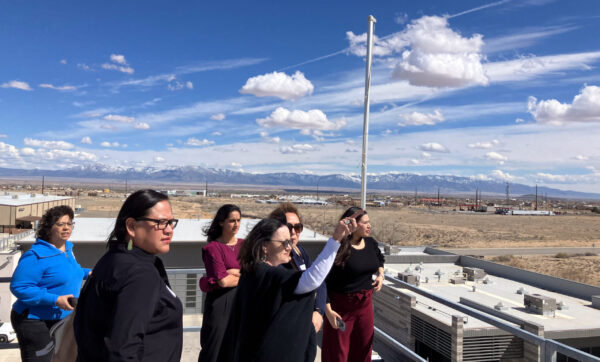Q&A: Sarah Buck to Lead New Projects for RCAP Solutions
Sarah Buck will be leaving her role as Chief Programs Officer at RCAP’s national office on August 2 to rejoin RCAP Solutions, our Northeast RCAP affiliate, where she worked for more than two years as the Deputy Director of Community Resources prior to coming to the national office. In her more than five years at the national office, Sarah has been instrumental in RCAP’s growth, both in terms of leading our fund development efforts, managing our ever-increasing programs and partnerships, and in strengthening our reporting. Sarah was originally hired to manage RCAP’s philanthropically funded regionalization work which quickly expanded to include all programs, fund development, and eventually helping support the Data & Impact and Research work as well. While we am sad to see her go, we are heartened that she is staying in the RCAP network.
Below is a brief Q&A with Sarah about what she will be doing at RCAP Solutions and her thoughts on her time at RCAP’s national office.
 Q: What role are you taking on with RCAP Solutions?
Q: What role are you taking on with RCAP Solutions?
Buck:I will be their New Project Director. In this role I will be helping to stand up, nurture, and grow existing and new strategic programs to help RCAP Solutions more holistically serve rural and Tribal communities in the Northeast and US Caribbean. This will include grant management, fundraising, partnership building, and assisting with field work on programs like the DOT Thriving Rural Communities FY23 TA program, EPA’s WIIN Lead Remediation in Schools and Childcare, USDA’s Community Facilities and Community Facilities Disaster programs, regionalization work, and Spring Point’s Rural Leadership Insitute for Water which will be piloted this year in Spanish in Puerto Rico.
Q: What are you looking forward to most about your new role?
Buck: I have not done deep work in the field with communities since 2016 when I was at RCAC, RCAP’s western partner, and cannot wait to roll up my sleeves, continue to build my skills and directly impact and empower rural and Tribal communities with my own two hands.
Q: How do you feel about heading back to an RCAP region for your new position?
Buck: I am so excited to get back to my roots. I say I am an RCAP unicorn because there are many people in the network who have worked for 2 RCAP partners and others who do what we call a “boomerang” and leave the network and return but I think I am the only one who has worked for 3 of the seven organizations and then gone back to one of them. I have seen the work from the field, the back office at the regional level, as a regional program manager and in the spotlight at the national level so am excited to take all that I have learned and bring it back to the region of the country where I have spent most of my life. I’m originally from New Hampshire, went to college in Vermont, lived in Massachusetts after returning from California where I lived for six years, and now live in Maine.
Q: What will RCAP’s shift to Community-Led Rural Development (CLRD) mean for the communities our network serves? How is it both similar and different from what we’ve done over the last 50 years?
Buck: Our traditional infrastructure work in water, wastewater, and later on over time, solid waste is foundational to any community to survive. It goes back to Maslow’s hierarchy of needs—we need the basics to get anywhere. CLRD is really building on that so that small, rural, and Tribal communities do not just survive but thrive. It is building the vertical or human infrastructure that is necessary for the horizontal infrastructure to succeed—to be sustainable, equitable and resilient. All my work will touch RCAP’s 8 main CLRD business lines which together will allow us to serve communities much more holistically instead of in traditional silos which hinder collaboration and slow down progress. If we are replacing the sidewalk to help re-vitalize Main Street, why not replace some lead service lines and add fiber at the same time so people can have safe drinking water, high speed internet and access to economic vitality all at once?
Q: You have been with RCAP National since 2019. What are you most proud of as you look back on your time here?
Buck: Through my diligent program management, relationship building and maintenance, attention to detail, global mindset, and knack for fund development, I believe my individual work and the work of those I have hired, trained, coached, and helped develop have allowed us to really step into this role as not only a longstanding but a premier technical assistance provider, the gold standard, a network that federal and philanthropic funders alike can rely on and a powerful voice for small, rural, and Tribal communities across the country that will get the hard work done.
Q: What are you most excited about for RCAP’s future? What challenges do you see the network facing and working to overcome?
Buck: We have been growing exponentially. When i joined the network in 2013 I think the national office had 5-7 people and the network had about 150-200 TA providers on the ground. When I joined national in 2019, we had about 13-15 people at the national office and 250 people in the field. Now we have close to thirty people at the national office and have close to 400 field staff across the country. With growth comes growing pains so we as a network need to continue to build the scaffolding to support that growth and to ensure that quantity does not dilute quality. Even with the Bipartisan Infrastructure Law winding down in the next few years and with potential shake ups in Washington politically, I do not see us shrinking, only adapting to a shifting climate, especially with our move to providing more holistic support to the communities that need it most. We will just need to think outside of the box and do what we do best, which is making rural America a place where people want to live, work, and play.
Thank you, Sarah, for all of your work on behalf of RCAP’s programs and the communities we serve. In the interim, our CEO, Olga Morales-Pate, will be working closely with our Programs Team to continue to advance all our new and traditional programming, ensuring that RCAP will remain the gold standard through this transition.


